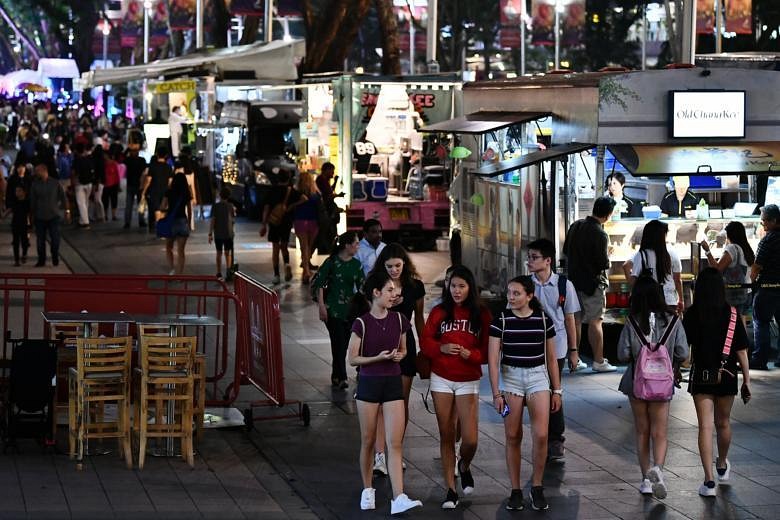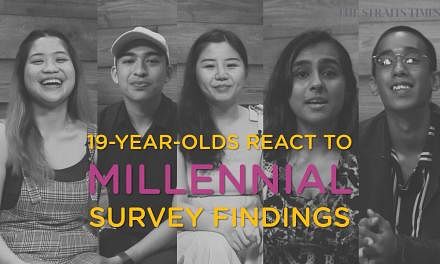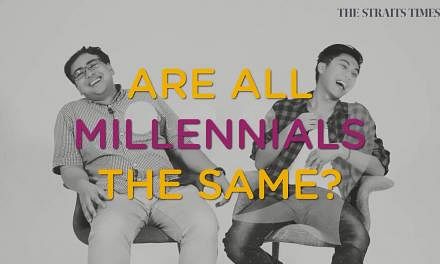Here are the key findings of the 19+ Worldview survey taking into account the context of what these young people have seen, heard or experienced by way of history and culture since their birth.
1. Only about 15 per cent of their parent's generation went to university. But nine in 10 of the 19-year-olds now want to go to university. The government's pledge of a cohort participation rate of 40 per cent falls far short.
2. They say they are seeking degrees simply to earn higher salaries and access the careers they want. Only 37 per cent said they want a degree for the status it confers upon them.
3. By the time they sat for the primary school leaving examination (PSLE) and were considering their secondary school options, the Integrated Programme (IP) had been established in several top secondary schools, including Hwa Chong and Raffles. So, not surprisingly, more than half of those who went to an IP school, had consciously aimed for it. The top two reasons for aiming for the IP - no need to sit for O levels and wanting to get into a top school. One in three said they wanted the IP for the prestige it brought while one in five said their parents wanted them to enter the IP.
4. Education Minister Ong Ye Kung recently announced that the Normal-Express stream divide will be done away with and replaced with subject-based banding. But, surprisingly, most 19-year-olds felt it is appropriate for students to be streamed. Not so surprisingly, those who were advantaged by the streaming system - students from JCs and IP schools - favoured streaming more than those in polytechnic and ITE.
5. At first glance, their views on the PSLE appeared contradictory - they said it was stressful but at the same time, they said the exam should stay. But it came through during focus group discussions that their parents are the ones who are stressed out over exams. The students see exams as fair and transparent way to stream them.
6. They want jobs with a purpose. The paycheck is less important. When asked what counts in a job, 42 per cent said it must be meaningful. Only 17 per cent said good salary prospects are important.
7. Education pathways were aligned with salary aspirations, with those from the JC and IP route, expecting to go on to university and starting on salaries of $3,900.
8. Despite the strides made on closing the salary gaps between males and females, the females had lower salary aspirations than their male peers.
9. They were born at the time when mobile phones and laptops were ubiquitous. They got their first phones at age 11 and their first laptop at 13, just as they entered secondary school.
10. Females get their phones earlier, but when it comes to laptops it is the males who get them earlier. IP students got their phones a year earlier as well.
11. The majority spend five to six hours a day on the phone. One in five, say they wake up to check their mobiles, with most checking them one to three times a night. This group also reported 2.5 hours more of daily usage.
12. Those in the highest socioeconomic status (SES) group are less hooked on phones - spend at least one hour less on them each day. Those from disadvantaged segments tend to overuse mobile phones.
13. Three out of five follow social media influencers, with more than 80 per cent saying that they do so because of the content they create.
14. One in five actually prefer interacting through social media rather than face-to-face, while one in three say they would feel lost if they had no access to social media for a day.
15. The government may fret about young Singaporeans not marrying and starting families. But close to nine in 10 say they wish to get married, and 86 per cent wish to have children. The majority said they would like to do so by the time they turn 30.
16. The fake news law is hotly debated, but among the 19-year-olds, the majority - 70 per cent - agree that there is a need to control the dissemination of fake news.
17. Asked about other laws - including 377A and the ban on chewing gum - about half of them said laws concerning gay rights and 377A should be relooked.
18. They have never known Mr Lee Kuan Yew as their Prime Minister. For most of them, he was their Prime Minister's father. By the time they were born, Mr Goh Chok Tong was PM, followed by PM Lee Hsien Loong. They prefer a "gentler", "softer" and more consultative style of governance, an opening up of civic space.
19. Asked if the race of a PM was an important factor in voting during the next election, 51 per cent said it was not important at all.
20. Reading widely, including online newspapers, correlates with being better informed. The survey found that those who report reading various types of materials are more likely to say there are laws which should be changed. The most significant effect is seen with those who report reading e-newspapers.








